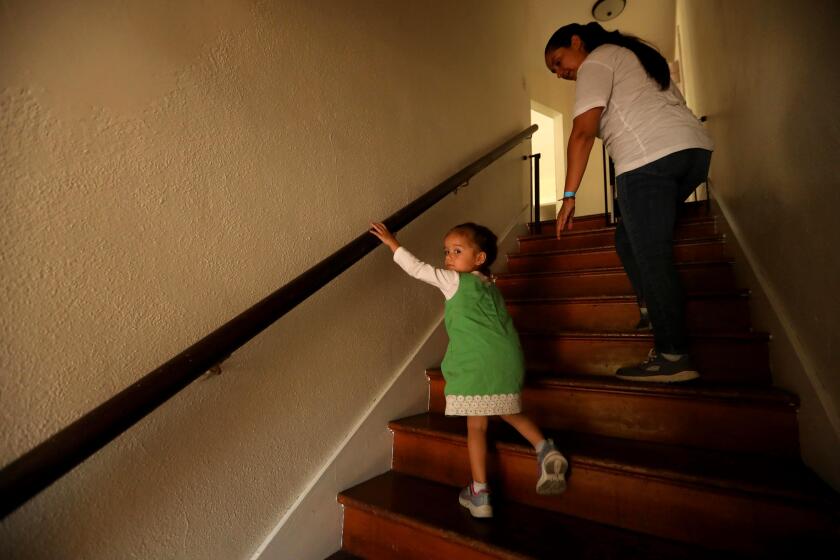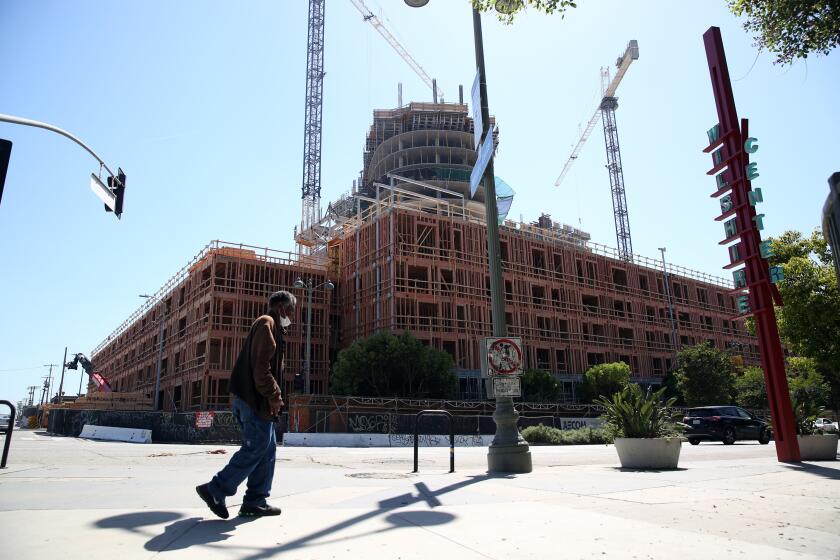Los Angeles voters want more housing but worry it won’t help them, poll finds

- Share via
A strong majority of Los Angeles voters support building more housing across the city but are skeptical that it will benefit them or ease cost pressures in their neighborhood, a new poll has found.
The mix of messages offers both promise and pitfalls for policymakers hoping to better the city’s long-standing housing challenges by promoting new growth and speedier construction of low-income development. More than anything, the findings show Angelenos hungry for solutions to a housing problem that is leading many to consider leaving the city, said Mark DiCamillo, poll director at UC Berkeley’s Institute of Governmental Studies who reviewed the survey on the Times’ behalf.
“There is a mode of, ‘Let’s see what works and what doesn’t,’” DiCamillo said of voters. “Throw it all against the wall and see what sticks.”
By a 2-1 margin, voters backed substantially increasing home building in the city compared with those who opposed widespread construction because it would worsen population and traffic problems.
The poll, known as the 2024 LABC Institute Housing Affordability Survey in Partnership with the Los Angeles Times, surveyed 600 registered voters in the city of Los Angeles between April 3 and 7.
Support for rental housing in voters’ own neighborhoods rated higher than construction overall. At least 8 in 10 of those surveyed favored the building of income-restricted affordable housing generally and apartments for veterans, public service workers, low-income seniors and low-income families with children.
Even building long-term housing with social services for homeless residents, which often attracts local opposition out of perceived safety concerns, garnered support from nearly two-thirds of voters.
“You can’t be mad at people being homeless but then also not want them to have affordable homes,” said Justice Allen, a 28-year-old renter living in the San Fernando Valley during a focus group conducted as part of the poll.
Academic research provides significant evidence that new housing construction decreases rents or slows their growth in a region as a whole, though there’s less consensus on the effects of home building in a particular neighborhood.
Many in the LABC-Times survey expressed doubt that building would help their own situations. Some believed it would worsen housing problems.
A plurality of voters, 49%, said that new housing in their neighborhood would drive up costs and push residents out compared to 40% who said the developments would make their community more affordable.
Nearly three-quarters of renters and those under 35 have considered moving out of Los Angeles because housing costs are too high, according to a new poll.
“If they are building these high rises in the neighborhood, then other landlords that are already there are going to want to match the rents,” said Erika Conner, a 37-year-old renter from South L.A. in the focus group.
More than 4 in 10 renters believed that building apartments for people with low to moderate incomes in their neighborhood would have no effect on their housing costs, while 26% said it would increase their monthly payments and 22% said it would decrease them.
Meantime, 56% of homeowners polled said new apartments for low- to moderate-income residents would reduce their property values.
Homeowners in the focus group worried that bringing lower income residents into their neighborhoods would worsen a quality of life they’d worked hard to attain.
“My personal reason for moving to that neighborhood was to be in a really nice part of town where it’s quiet, low crime,” said Ron Allen, a 46-year-old homeowner in Playa Vista. “It very much feels like the suburbs. Man, I feel horrible saying it, but I don’t want to change that. I’m paying a crap ton of money for that environment.”
The poll did offer some consistency in views on growth. For voters who said that new housing would make their neighborhood more affordable, 82% said the city should build a lot more. Of those who believed new housing in their neighborhoods would drive up costs, half did not support a substantial increase in building.
The finding shows that politicians will have to work to convince Angelenos that specific housing proposals will benefit them, DiCamillo said.
“You have to almost make the case to voters if you’re trying to sell this that this is actually not going to result in higher priced housing in your area and that it won’t force people out,” he said.
Opinions on potential solutions to L.A.’s housing problems showed large divides between renters and young adults on one side and homeowners and senior citizens on the other. In multiple cases, renters and those under 35 were at least 15 percentage points — and in some instances more than 30 percentage points — more likely to support new construction in specific locations or targeted toward certain populations than homeowners and those over 65.
Developers built fewer homes in California in 2023, potentially leading to higher prices and rents as a supply shortage worsens.
More than 6 in 10 renters and more than two-thirds of those under 35 believed that the lack of affordable housing in the city was so serious that the state government should penalize local governments that block construction. Only 42% of homeowners and 39% of those over 65 agreed.
The discrepancy reflects the differences in who is bearing the burden of the city’s housing problems. A majority of Angelenos are renters, and the poll found renters and young people far more affected by high housing costs than homeowners and senior citizens.
“There are very few issues in American life and culture and politics where it’s not driven by race or income, even,” said Fred Yang, the chief executive officer of Hart Research, the Washington, D.C.-based firm that administered the poll. For many results in this survey, Yang said, “it’s, really, do you own a house or do you rent?”
The survey provided support for one of Mayor Karen Bass’ primary efforts to address the city’s housing challenges, with the caveat that there was little awareness of her plan in focus groups until it was described. Within days of taking office in 2022, Bass issued Executive Directive 1, an emergency measure aimed at fast-tracking the permitting and approval of low-income developments.
In her recent State of the City address, Bass touted that the measure had shaved nearly five months off permitting timelines for these projects and that 16,000 additional affordable housing units were in the city’s pipeline as a result.
Councilmember Eunisses Hernandez wants to keep tenants from being pushed out of 17 rent-controlled apartments in Eagle Rock. The site is slated to become affordable housing.
Bass is now pushing for the policy to be made permanent. The poll found that nearly 7 in 10 voters supported doing so. Additionally, more than three-quarters of those surveyed favored expanding Executive Directive 1 to include housing affordable to middle-income residents, such as nurses, teachers and firefighters, who earn too much to qualify for apartments permitted under the current version.
Voters in the focus groups weren’t familiar with city efforts to address housing affordability in general, but once they heard details of Bass’ plan, the response was strong, said Aileen Cardona-Arroyo, a senior vice president at Hart Research.
“At some level, people know that there’s so much bureaucracy and red tape in L.A. and L.A. politics,” Cardona-Arroyo said.
The poll surveyed registered voters in Los Angeles over the phone and via text message to the web. The margin of error is plus or minus 4 percentage points for city voters overall and higher for subgroups. Hart Research conducted two focus groups, one of renters and one of homeowners, who both came from a mix of city neighborhoods on April 9.
More to Read
Sign up for Essential California
The most important California stories and recommendations in your inbox every morning.
You may occasionally receive promotional content from the Los Angeles Times.










